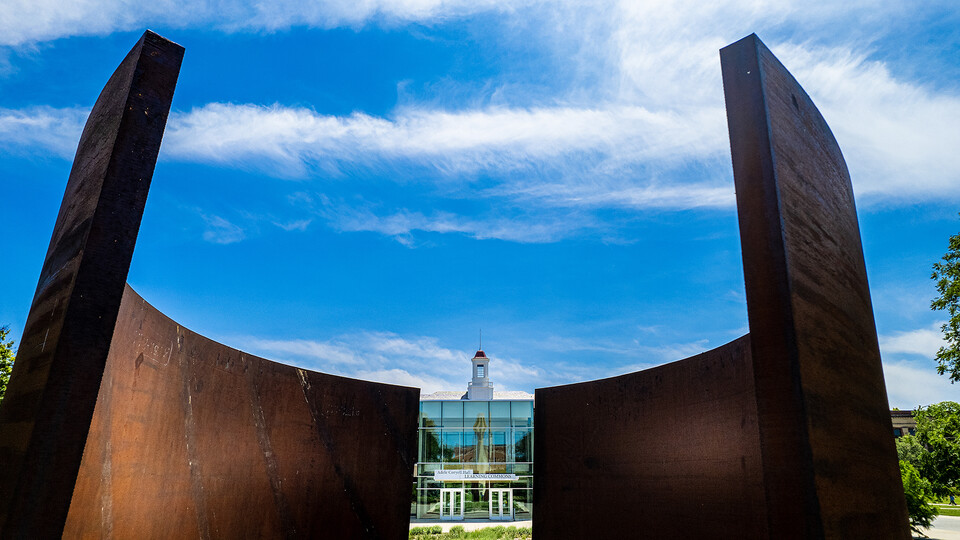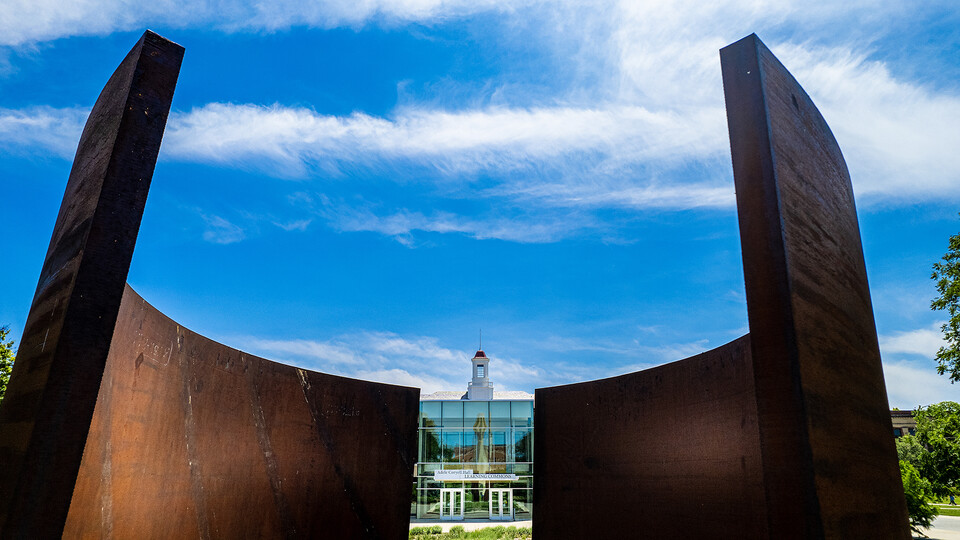
One office in Andrews Hall is unlike any other at the University of Nebraska-Lincoln.
Immediately after walking in, visitors are greeted by the smiling face of an aged man, renowned science fiction author James E. Gunn, from the cover of a book on display. A paperback copy of “The Science Fiction Hall of Fame,” battered and yellowed, sits on a desk filled with just the right amount of clutter to almost seem intentional. In the corner a metal bookshelf teems with titles threatening to crumble if another Isaac Asimov novel comes near it.
At the center of all of this is Michael Page, an English professor at UNL specializing in a number of science-fiction topics. Every semester he teaches a course introducing students to dozens of different science-fiction short stories and novels from different eras. In previous years he’s also taught seminars on famous monsters in science fiction as well as an H.G. Wells-focused course on scientific romance.
“It’s reached a point where it is my life, it’s what I do,” Page said.
It was only a little over 30 years ago, 1986, when Page was an undergraduate taking the same class he teaches today. At the time he’d been studying 19th century British literature, but his main fascinations have always revolved around science fiction.
Members of the genre’s community say the fascination begins with a single moment--known as “a sense of wonder.” Page described it as an epiphanic feeling: a moment where the literature makes people understand a concept or investing in a world that’s larger than themselves and continues after they’re gone.
“It’s just a small part of a larger experience,” Page said. “I really got this ‘Wow, these stories are kickass’ feeling. That was definitely a feeling of wonder, and I wanted more.”
Page said his older brother, Kevin, played a role in channeling him into the genre. Page noticed how space epics of the era such as “Star Wars,” “Planet of the Apes,” and most of all, “Star Trek,” captivated his brother.
The two had a mutual interest in the genre despite being the children of a psychologist and a social worker who weren’t interested in fiction.
“The way they grew up wasn’t necessarily in tune with pop culture the way that my brother’s generation was,” Page said.
He credited the Apollo 11 moon landing as an early trigger for them. His brother gave him his first science-fiction books before he went to college, where their two careers branched off.
While Page worked on his undergraduate degree, Kevin landed a role in the 1987 science-fiction action movie “RoboCop.”
With lives so steeped in science fiction, Page said many members of the genre’s community find their interests wane before completely burning out. This continues to be a concern for Page, who said even his identity is shaped by his love of the genre. Fortunately, he said his other obligations as a professor mean he still has to carve out time for personal interests.
“I still knock off about a novel a week or so,” Page said. “I try; I feel like I don’t want to get burned out.”
Page also credits this to his involvement in the genre being more scholarly than being an active writer. He said he had once aspired to be a writer but found he wasn’t that interested.
“I’m completely happy and satisfied with writing analytical scholarly work now,” Page said.
“[I want them to] witness imaginatively human beings doing different things in different contexts,” Page said. “And just to realize that how we’re doing things now is not gonna be how things are 30 years from now.”
Alexis Nyholm, a sophomore English major, took the course during the 2016 fall semester. She said she took the course after encountering science-fiction literature in other classes and found Page to be an impassioned professor.
“When he was lecturing, you could tell how into the subject he was,” Nyholm said. “He wasn’t just teaching it because he had to.”
Page said he generally gets good feedback from his students, particularly those who find that sense of wonder during the class. Nyholm said those students often met with him to have personal conversations, which would further foster their love of the genre.
Besides teaching the course, Page also runs a yearly science-fiction conference he’d initially attended when writer James E. Gunn hosted it at the University of Kansas in Lawrence. There, he connected with Gunn who brought him into the tight-knit community.
“He showed me how to bring the works and the ideas into a classroom as a teacher,” Page said.
In the future, Page plans on bringing Gunn to UNL to host a guest lecture on the genre and his lifetime experience as a writer and scholar. Page will also be running a conference in downtown Lincoln focused on science fiction across all mediums of entertainment: movies, comic books and video games, as well as literature.
For now he continues to be drawn to the senses of hope. He said he’s drawn to the wondrous possibilities science fiction brings him.
“It’s an awareness of perceptions and ideas beyond one’s own immediate experience,” he said. “It’s more of a hope than a predication.”


